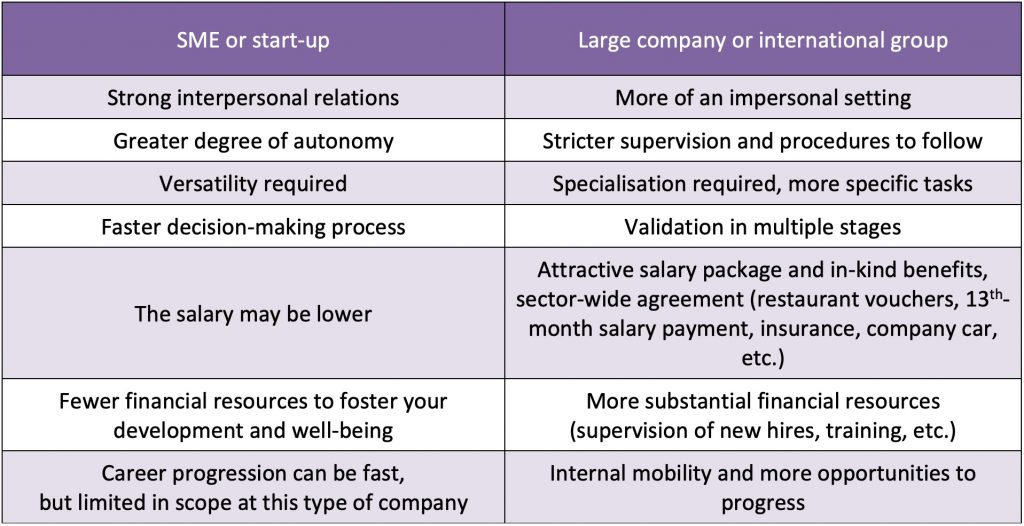Five criteria to help you choose the right employer
If you want to boost your career prospects and scope for personal development, choosing the right future workplace is of paramount importance. But it’s usually hard to truly get to know the company you’re thinking of joining in advance. How can you tell where you’ll be happiest? In this article, myLIFE will set out several key criteria to help you choose the right future employer.
Job hunting generally involves sending applications to lots of companies. It’s important to be strategic – sending out a generic CV to every company is not in your best interests as a candidate. Whether you’re at the application stage or about to accept a job offer, how can you be sure you’re making the right decision? The answer is that you have to research yourself just as thoroughly as you research the company!
So, let’s get straight to it and explore the five criteria that will help you choose the right employer.
Criterion no. 1: working conditions
This first criterion is obvious. Working conditions have an impact on your well-being. There are several aspects to consider and it’s up to you to weigh up each of them in light of your expectations and priorities.
The type of company. The challenges you’ll face and the working environment at a company that employs 2,000 people and one that employs four people will be very different. For instance, a communications officer at a large organisation will need to focus on a specific aspect of communications, whereas a communications officer at a smaller company will be required to show versatility and sometimes need to be willing to go beyond their field of expertise. It’s up to you to decide which environment would suit you best. Without stereotyping any companies, here are a few differences between small and large organisations.

The salary and any in-kind benefits offered are important, but they shouldn’t be the only criteria. Think about what motivates you in your day-to-day life.
The remuneration. Obviously, a higher salary is not a negligible factor when you’re choosing your future employer. However, the salary and any in-kind benefits offered shouldn’t be your only criteria. Think about what motivates you in your day-to-day life: the challenges associated with your role, recognition from your superiors, a sense of accomplishment, job security, etc.
The working space. Open spaces that foster communication among employees have become more common, but they tend to be noisier than traditional office environments (conversations, telephone calls, etc.). Do you need silence to concentrate? Or do you feel energised in a shared work space? For example, extroverts may find it hard to cope with being shut off in a private office. What setting would make you most productive?
The atmosphere. Are relations between the company’s staff members friendly or a bit strained? What about the people you work with directly? This may seem trivial at the start, but bear in mind that the environment will influence your quality of life at work in the long run.
You may find it helpful to check websites such as Choosemycompany, Glassdoor and Welcometothejungle to see how companies have been scored by their employees. This will give you an insight into how other employees have felt about the atmosphere at the company.
Criterion no. 2: work-life balance
The location. How far is the company from your home? Is it easy to get there on public transport? Do you have access to somewhere nearby where you can park your car? Bearing in mind the distance and the traffic at rush hour, does it seem like a feasible morning and evening commute? Do you have the option to work from home? Don’t underestimate the fatigue and stress that commuting can cause, particularly if you have a family. Ask yourself whether it’s really worthwhile to add an extra hour to your daily commute just for another €100 or €200 in your account at the end of every month.
Decide what matters to you: striking the right work-life balance or going the extra mile in the hopes of rising through the ranks more quickly.
The hours: What are the working hours at the company? Can you organise your own schedule (flexibility, part-time work, working from home, etc.)? Are you willing to work overtime if that’s part of the company’s culture?
Decide what matters to you: striking the right work-life balance or going the extra mile in the hopes of rising through the ranks more quickly. Of course, these shouldn’t be mutually exclusive, but it tends to be difficult to reconcile the two in many companies today.
Criterion no. 3: your role
The specific characteristics of your role depending on the company. The same type of role can look very different in different business sectors. A salesperson at an agri-food company will travel around a lot more than a salesperson at a bank, for example. Choose the context that’s right for you. Similarly, the same role may be perceived very differently depending on the company and your direct contribution to its profitability.
Your decision-making power. Don’t shy away from asking what your role in the company will be during the job interview. What will you be responsible for? Will you be able to make decisions alone or will you just have to execute other people’s decisions? Always having to have your work checked by your line manager won’t suit everyone!
Don’t lose sight of your professional aim and give yourself every chance of achieving it.
Career prospects. Another important consideration is your future. What are your career prospects at the company? Are the company’s policies seen as favourable to professional development? Are you hoping to have more responsibility in the future? Some people are looking for stability and a well-honed routine, whereas others prefer to know that they will be able to learn new skills and rise through the ranks. Don’t lose sight of your professional aim and give yourself every chance of achieving it.
Criterion no. 4: the company’s culture and values
The company’s values. Think carefully before going against your convictions because you run the risk of regretting it within a few months. If you’re a vegetarian, you’ll find it hard to work in the meat industry! You have to accept the company’s business sector and values (sustainable development, product quality, transparent relations with clients, etc.).
The company culture. Is there an informal dress code or do employees have to dress smartly? Do employees tend to eat lunch outside the office or is this frowned upon? Don’t forget that adopting all of these habits will be a key part of fitting in later on.
Criterion no. 5: the health of the company
What is the company’s economic and financial situation? Does its turnover seem excessive? It may be worth finding out more through specialised media or your professional contacts. You could also check social media and forums.
It’s probably better to choose a company in a growing sector, such as IT, rather than a company in a sector in decline. Doing a little bit of research will set your mind at ease in terms of your future at the company.
You now know everything you need to know to choose your ideal employer, send out your CV or choose your future boss. Good luck!


 Mortgage
Mortgage Personal loan
Personal loan Savings
Savings